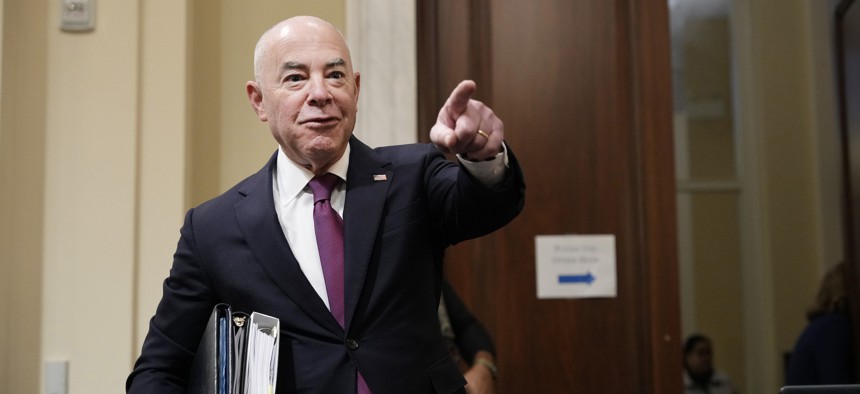DHS aims to lead in defense against ‘adversarial’ AI

Secretary of Homeland Security Alejandro Mayorkas arrives at a House Homeland Security Committee hearing on Capitol Hill on November 15, 2023. Drew Angerer/Getty Images
The agency’s secretary noted artificial intelligence has proven useful for DHS operations in many ways, but also cautioned that the technology can be used for more nefarious purposes.
The Department of Homeland Security is accelerating its use cases for artificial intelligence technologies in select agency operations, and aims to lead in responsible adoption.
“Our intention at DHS is to lead and to lead in the use of AI … in terms of the defense against the adversarial use of AI,” said DHS Secretary Alejandro Mayorkas during a panel discussion with Axios.
Mayorkas delved into several critical areas in agency operations where AI and machine learning models are being utilized. AI systems are currently aiding DHS operations in border patrol efforts and combating drug trafficking and creating age progression estimations of missing children.
The speed at which AI algorithms can collect, process and analyze large volumes of data and use predictive capabilities to make decisions is the key feature such systems offer DHS.
“The faster that we can make decisions, the faster we can identify anomalies, the more important,” he said. “I think that we are looking at AI in a wide array of fields.”
Another use case is report processing. Mayorkas explained that having an AI system help DHS officials review interviews and other reports — often totaling in the thousands — to identify patterns and make connections relieves such employees of labor-intensive tasks.
“Through AI, we can do that in a matter of seconds and really assist an investigator in identifying a connectivity that previously would not have been aware of,” he said.
While harnessing AI for DHS benefit, the agency is also aware of nefarious threats still posed by the lack of regulation and rapid ongoing innovation in the field. Mayorkas added that the agency is simultaneously working to mitigate these AI-specific risks, such as the spread of disinformation or the development of biological weapons using automation.
Following the release of new global guidance for AI development and deployment, DHS has joined the Biden administration’s efforts to push for a secure-by-design software development philosophy for more generative systems. Mayorkas stressed the importance of improving the public’s digital literacy and broader awareness of common phishing attacks, as well as continuing to forge new public-private sector collaborations.






